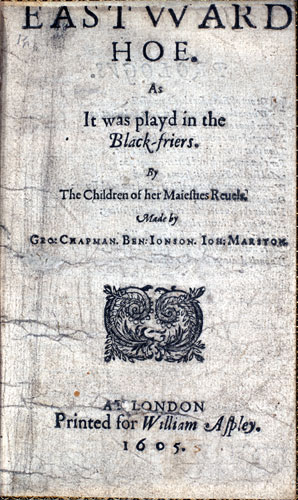
Thomas Dekker was an English Elizabethan dramatist and pamphleteer, a versatile and prolific writer, whose career spanned several decades and brought him into contact with many of the period's most famous dramatists.
What You Will is a late Elizabethan comedy by John Marston, written in 1601 and probably performed by the Children of Paul's, one of the companies of boy actors popular in that period.

John Marston was an English playwright, poet and satirist during the late Elizabethan and early Jacobean periods. His career as a writer lasted only a decade. His work is remembered for its energetic and often obscure style, its contributions to the development of a distinctively Jacobean style in poetry, and its idiosyncratic vocabulary.
City comedy, also known as citizen comedy, is a genre of comedy in the English early modern theatre.
The Lord Chamberlain's Men was a company of actors, or a "playing company", for which Shakespeare wrote during most of his career. Richard Burbage played most of the lead roles, including Hamlet, Othello, King Lear, and Macbeth. Formed at the end of a period of flux in the theatrical world of London, it had become, by 1603, one of the two leading companies of the city and was subsequently patronized by James I.

Eastward Hoe or Eastward Ho! is an early Jacobean-era stage play written by George Chapman, Ben Jonson and John Marston. The play was first performed at the Blackfriars Theatre by a company of boy actors known as the Children of the Queen's Revels in early August 1605, and it was printed in September the same year.

The Spanish Tragedy, or Hieronimo is Mad Again is an Elizabethan tragedy written by Thomas Kyd between 1582 and 1592. Highly popular and influential in its time, The Spanish Tragedy established a new genre in English theatre, the revenge play or revenge tragedy. The play contains several violent murders and includes as one of its characters a personification of Revenge. The Spanish Tragedy is often considered to be the first mature Elizabethan drama, a claim disputed with Christopher Marlowe's Tamburlaine, and was parodied by many Elizabethan and Jacobean playwrights, including Marlowe, William Shakespeare and Ben Jonson.

Every Man out of His Humour is a satirical comedy written by English playwright Ben Jonson, acted in 1599 by the Lord Chamberlain's Men.
The War of the Theatres is the name commonly applied to a controversy from the later Elizabethan theatre; Thomas Dekker termed it the Poetomachia.

The Merry Devil of Edmonton is an Elizabethan-era stage play; a comedy about a magician, Peter Fabell, nicknamed the Merry Devil. It was at one point attributed to William Shakespeare, but is now considered part of the Shakespeare Apocrypha.

Jack Drum's Entertainment, or the Comedy of Pasquil and Katherine is a late Elizabethan play written by the dramatist and satirist John Marston in 1600. It was first performed by the Children of Paul's, one of the troupes of boy actors popular in that era.

Blurt, Master Constable, or the Spaniards' Night Walk is a late Elizabethan comedy, printed anonymously in 1602 and usually attributed to either Thomas Middleton or Thomas Dekker.

Poetaster is a late Elizabethan satirical comedy written by Ben Jonson that was first performed in 1601. The play formed one element in the back-and-forth exchange between Jonson and his rivals John Marston and Thomas Dekker in the so-called Poetomachia or War of the Theatres of 1599–1601.
Cynthia's Revels, or The Fountain of Self-Love is a late Elizabethan stage play, a satire written by Ben Jonson. The play was one element in the Poetomachia or War of the Theatres between Jonson and rival playwrights John Marston and Thomas Dekker.

The Coronation Triumph is a Jacobean era literary work, usually classed as an "entertainment," written by Ben Jonson for the coronation of King James I and performed on 15 March 1604. Jonson's work was half of a total performance, the other half written by Thomas Dekker. The work was especially significant in the developing literary career of Jonson, in that it marked the commencement of his role as a writer of masques and entertainments for the Stuart Court, a role he would fill for the next three decades.

Westward Ho is an early Jacobean-era stage play, a satire and city comedy by Thomas Dekker and John Webster that was first performed circa 1604. It had an unusual impact in that it inspired Ben Jonson, George Chapman and John Marston to respond to it by writing Eastward Ho, the famously controversial 1605 play that landed Jonson and Chapman in jail.

Englishmen for My Money, or A Woman Will Have Her Will is an Elizabethan era stage play, a comedy written by William Haughton that dates from the year 1598. Scholars and critics often cite it as the first city comedy. Indeed, the play inaugurated a dramatic subgenre that would be exploited and developed by Thomas Dekker, Thomas Middleton, Ben Jonson, and others in the following years and decades.
Summer's Last Will and Testament is an Elizabethan stage play, a comedy written by Thomas Nashe. The play is notable for breaking new ground in the development of English Renaissance drama: "No earlier English comedy has anything like the intellectual content or the social relevance that it has."
The Blind Beggar of Alexandria is an Elizabethan era stage play, a comedy written by George Chapman. It was the first of Chapman's plays to be produced on the stage; its success inaugurated his career as a dramatist.

Frank Percy Wilson was a British literary scholar and bibliographer. Author of many works on Elizabethan drama and general editor of the Oxford History of English Literature, Wilson was Merton Professor of English Literature at the University of Oxford from 1947 to 1957.













